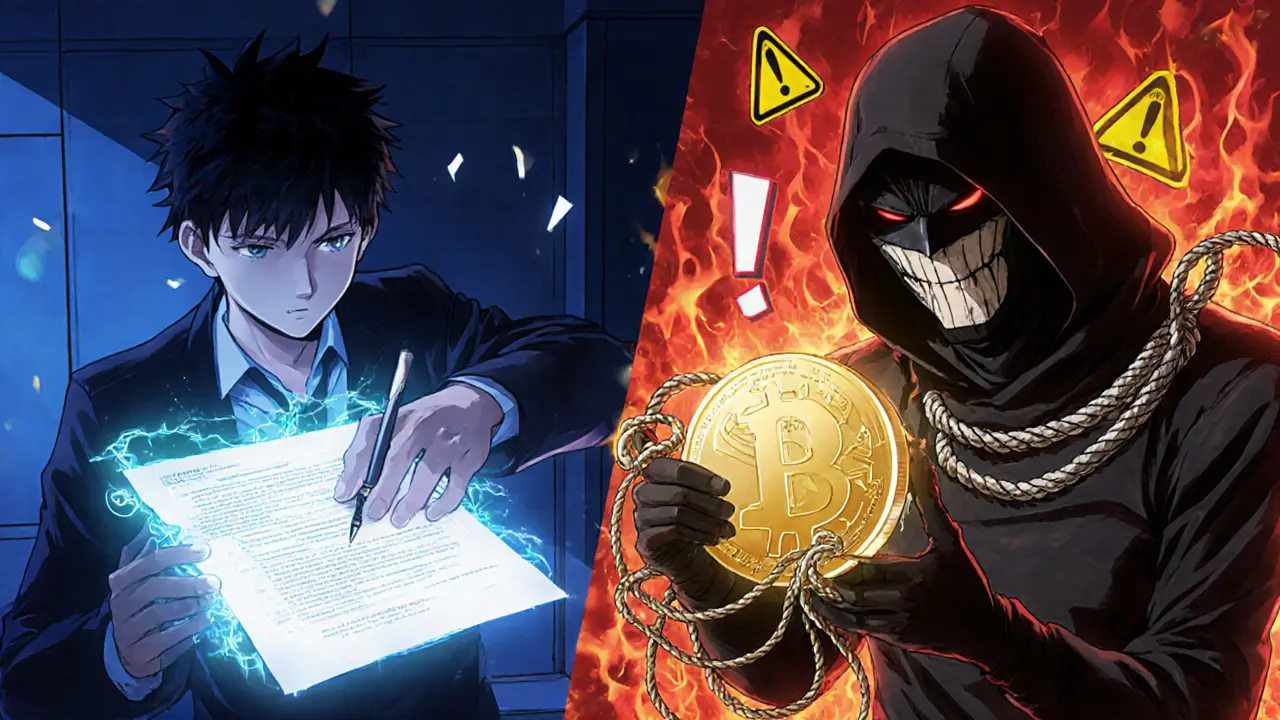Airdrop Scam Detector
Select the indicators you observe in an airdrop offer to determine if it's likely a scam.
Each selected indicator increases the risk level. If multiple indicators are present, the chance of being scammed significantly increases. Always verify airdrop announcements on official sources and never share sensitive information like private keys or seed phrases.
Quick Take
- Never share your private key or seed phrase - legit airdrops don’t ask for them.
- Verify announcements on official project channels; look for verified social accounts.
- Use a dedicated, low‑balance wallet for any airdrop participation.
- Avoid clicking random links or signing unknown smart‑contract approvals.
- If you suspect a scam, disconnect the wallet and report the address to community forums.
Cryptocurrency enthusiasts love the thrill of a free token drop, but that excitement also attracts fraudsters. A airdrop scam tricks users into handing over control of their wallets, often by mimicking real projects and exploiting the fear of missing out. Below you’ll learn how these scams work, the tell‑tale signs to watch for, and the concrete steps you can take to stay safe.
What an Airdrop Is - and Why Scammers Want It
In the crypto world, an airdrop is a marketing stunt where a project distributes free tokens to early adopters or community members. Projects like Uniswap a decentralized exchange that pioneered token airdrops as user‑growth incentives and ApeCoin have used this tactic to rapidly expand their user base.
Scammers copy this model because a successful airdrop promises high engagement and, potentially, large payouts. By posing as a legitimate project, they can lure users into unsafe actions that give the attacker full access to valuable assets.
How Scammers Pull Off the Heist
Behind every fraudulent campaign is a set of technical tricks designed to steal wallet control. The most common vectors include:
- Private key the secret string that unlocks full ownership of a crypto wallet requests masquerading as “verification” steps.
- Seed phrase a 12‑ or 24‑word mnemonic that can regenerate a wallet prompts, often wrapped in urgent language.
- Malicious smart contracts self‑executing code that can move funds without further user interaction that users unknowingly approve.
- Requests for an upfront “processing fee” that disappears the moment it’s paid.
- Use of polished Telegram bot automated chat agents that send fake airdrop links and claim authenticity to create a sense of community.
These methods often appear together. A typical scam flow starts with a DM on Telegram or Discord promising an exclusive token, then directs the victim to a fake website where they connect a wallet-usually MetaMask a popular browser‑based wallet used for interacting with dApps. After the connection, the site asks the user to sign a contract that silently grants the attacker unlimited transfer rights. Once approved, the scammer can drain the wallet with a single transaction.
Red Flags: Spotting a Fake Airdrop
Scam creators get better every day, but they still slip up. Keep an eye out for these warning signs:
- Any request for your private key or seed phrase. Legit projects never need them.
- Unverified URLs or misspelled domain names (e.g., "uniswap-official.com" instead of "uniswap.org").
- Grammar errors, awkward phrasing, or all‑caps headlines that feel "spammy".
- Offers that promise far‑above‑market rewards, such as 10,000 tokens for a tiny fee.
- Tokens whose names embed URLs (e.g., "ETHWIN.com Token"). These are classic trap tokens.
- Mandatory fees before you can claim the airdrop. Genuine drops are free.
- Lack of clear eligibility criteria, distribution timeline, or official documentation.
When in doubt, cross‑check the announcement on the project's official Twitter, Discord, or website. If the channel is not verified-look for the blue checkmark on Twitter or the official badge on Discord-treat the claim as suspicious.

Technical Safeguards: Hardening Your Wallet
Even if you’re careful, accidents happen. Strengthen your setup with these measures:
- Use a hardware device like a Ledger hardware wallet a physical wallet that stores private keys offline, reducing exposure to web‑based attacks for long‑term holdings.
- Maintain a separate “airdrop” wallet with a tiny amount of ETH or BNB-just enough to cover gas fees.
- Enable two‑factor authentication (2FA) on every exchange and crypto service account.
- Turn off auto‑approval of token contracts in your wallet settings; manually review each transaction.
- Hide unknown tokens in your wallet UI to avoid accidental clicks that trigger malicious contracts.
Remember, hardware wallets protect your keys but not the smart contract interaction layer. Signing a malicious contract will still let the attacker move tokens, even if the private key never leaves the device.
Behavioral Defenses: The Power of Good Habits
Technology can only do so much-your habits are the final line of defense. Follow these practices:
- Always verify the source. Check the announcement on the project’s official blog or GitHub repo.
- Never click links from random DMs or unverified social posts. Type the URL manually or use a bookmark.
- Stay skeptical of “exclusive” offers-if it feels too good to be true, it probably is.
- Keep abreast of current scams via reputable news sites like CoinDesk, The Block, or security‑focused channels (e.g., Ledger Academy).
- If a site asks you to "unlock" a token, close it instantly. Ignoring unknown tokens is the safest move.
What to Do If You’ve Been Targeted
Act fast to limit damage:
- Disconnect the compromised wallet from all dApps immediately.
- Transfer any remaining funds to a fresh, secure wallet-preferably a hardware device.
- Revoke the malicious contract’s approvals using tools like Etherscan’s token approval revoker.
- Report the phishing address to the blockchain explorer (Etherscan, BscScan) and to the platform where you saw the scam (Telegram, Discord).
- Inform your community-post on subreddit or Twitter with the scam details to warn others.
While recovery is rare, swift action can prevent the attacker from pulling the rug on all of your assets.
Legitimate vs. Scam Airdrop - Quick Comparison
| Aspect | Legitimate Airdrop | Scam Airdrop |
|---|---|---|
| Announcement source | Official website, verified social accounts, reputable news outlets | Random DM, unverified URL, misspelled domain |
| Key requirements | Hold a specific token, meet snapshot date, no fees | Provide private key/seed phrase, pay upfront fee |
| Token name | Clear branding, no embedded URLs | Names contain URLs or suspicious characters |
| Smart‑contract interaction | Read‑only claim contract, never asks for approvals | Requires signing a contract that grants unlimited access |
| Community feedback | Positive reports on Reddit, Discord, official forums | Numerous scam warnings, loss reports, black‑list entries |
Frequently Asked Questions
Do legitimate airdrops ever ask for a fee?
No. Real airdrops are free distribution mechanisms. If a claim asks you to send ETH, BNB, or any other token first, it’s almost certainly a scam.
Can I use a hardware wallet to stay safe?
Hardware wallets protect your private keys from web‑based theft, but they won’t stop you from signing a malicious smart contract. Always review transaction details before confirming.
How do I check if a token contract is malicious?
Use block‑explorer tools (Etherscan, BscScan) to view the contract’s source code and see if it contains functions like transferFrom that can move all tokens. Community audit sites often flag known malicious contracts.
Is it safe to interact with unknown tokens in my wallet?
No. Even merely clicking “Swap” or “Approve” on an unknown token can trigger a contract that empties your wallet. The safest approach is to hide the token and ignore it.
What’s the best way to verify an airdrop announcement?
Cross‑check the claim on the project's official website, their verified Twitter handle, and the GitHub repo. Look for a dedicated blog post or a link from a reputable crypto news outlet.










Comments (25)
emmanuel omari
July 29, 2025 AT 21:15 PMListen up, everyone – airdrop scams are nothing new, but they keep getting slicker. If a site asks for your private key or seed phrase, you’re already compromised. The moment you hit “approve” on a shady contract, the attacker can drain everything. Verify the project's official channels before you even click. Stay vigilant and don't let the hype blind you.
katie littlewood
August 3, 2025 AT 06:48 AMEmbarking on the journey of airdrop hunting can feel like chasing rainbows in a digital wonderland, where every glittering promise tempts the curious mind.
Yet, amidst that kaleidoscope of opportunity, lurk cunning tricksters whose primary goal is to siphon off your hard‑earned crypto treasure.
These impostors master the art of masquerading as reputable projects, often mimicking official logos, typography, and even the cadence of the community's chatter.
One of the most egregious red flags is the audacious request for your private key, a secret that should remain locked away like the crown jewels.
Never, under any circumstance, share that golden string; legitimate airdrops have no business asking for it.
Equally deceptive are the seed‑phrase solicitations, where an urgent tone convinces you that a simple phrase will unlock a bounty of free tokens.
Remember that only the wallet owner should ever possess that mnemonic, and even the most trusted platforms never demand it for airdrop participation.
Beware also of the so‑called “processing fee” – a clever ploy designed to extract a few ETH or BNB before granting you any tokens.
If a claim demands you to send money first, the likelihood of a scam skyrockets to astronomical heights.
Inspect URLs with a fine‑tooth comb; a single misplaced character or a deceptive subdomain can betray a counterfeit site.
Grammar mishaps, all‑caps shouting, and exaggerated reward figures are additional breadcrumbs leading you to the trap.
A healthy habit is to cross‑check announcements on the project's official Twitter, Discord, or their verified GitHub repository.
Look for the blue checkmark on social media, or a direct link from a reputable crypto news outlet, as these serve as trustworthy beacons.
Utilize hardware wallets for your main holdings, reserving a modest, low‑balance wallet for any experimental airdrop interaction.
Enable two‑factor authentication everywhere, and keep the permissions on smart contracts at a minimum, revoking any unused approvals promptly.
In essence, a combination of skepticism, diligent verification, and disciplined security practices will shield you from the ever‑evolving web of airdrop scams.
Jenae Lawler
August 7, 2025 AT 16:21 PMIt would be remiss to presume that every airdrop promulgated across the ether is benign, for the digital realm is replete with artifices. One must, therefore, scrutinise each proclamation with a rigor that borders on the scholarly. The demand for private keys, albeit cloaked in ostensible legitimacy, constitutes an unequivocal transgression of best practice. Moreover, the pretence of "urgency" serves merely to obfuscate the underlying malfeasance. A discerning participant ought to cross‑reference the announcement with the project's canonical repositories. Should any deviation from the established canon be observed, the venture is, in all likelihood, a charade. It is incumbent upon the community to uphold these standards, lest we be submerged beneath a tide of deceit. In summary, a judicious approach is indispensable.
Chad Fraser
August 12, 2025 AT 01:55 AMYo, if something sounds too good, it probably is. Always double‑check the source before you click.
Jayne McCann
August 16, 2025 AT 11:28 AMThese scams are getting slicker every day.
Evie View
August 20, 2025 AT 21:01 PMLook, I’m not here to sugarcoat anything – the moment you hand over a seed phrase, you’ve handed over the keys to your kingdom. The scammers thrive on that panic‑induced urgency, telling you it’s “mandatory”. Don’t fall for it. Verify, verify, verify before you even think about signing.
Sidharth Praveen
August 25, 2025 AT 06:35 AMKeeping an eye on airdrop announcements can be rewarding, but only if you stay grounded. A red flag that’s often missed is the request for a tiny “processing fee” – that’s a classic lure. The grammar and spelling errors are not just sloppy; they’re a signal that the operation isn’t professional. Always trace the link back to the official domain before you interact. Stay optimistic but prudent.
Somesh Nikam
August 29, 2025 AT 16:08 PMFirstly, I commend you for seeking clarity – it’s essential in this space. The phenomenon of malicious smart‑contract approvals is particularly insidious; a single signature can grant unlimited access. I recommend using a dedicated, low‑balance wallet for any airdrop engagement; keep your primary holdings isolated. Additionally, regularly audit your token approvals on Etherscan – revoking any that appear suspicious is a prudent habit. If you follow these steps, the risk diminishes considerably. Remember, vigilance is the best defense. 🙂
Jan B.
September 3, 2025 AT 01:41 AMCheck official channels before trusting any airdrop claim. Minimal punctuation keeps the message clear.
MARLIN RIVERA
September 7, 2025 AT 11:15 AMAnother wannabe crypto guru spouting nonsense. These so‑called “exclusive” drops are just bait. Most users fall for the hype and lose everything.
Debby Haime
September 11, 2025 AT 20:48 PMHey folks, great that you’re digging into airdrop safety! I’d add that keeping software up‑to‑date is vital – old wallets can have exploitable bugs. Also, be wary of any site that asks you to “unlock” a token without a clear purpose. Use a hardware wallet for larger balances, and keep your everyday stash in a lightweight wallet. Let’s stay safe together!
Andy Cox
September 16, 2025 AT 06:21 AMJust a reminder – if it feels off, trust your gut. Low‑key approach saves headaches.
Courtney Winq-Microblading
September 20, 2025 AT 15:55 PMIn the grand tapestry of blockchain folklore, airdrops are the glittering festivals that draw crowds, yet shadows linger where the light is brightest. When a promise arrives wrapped in vivid graphics and urgent prose, it may well be a siren’s call, tempting the unwary sailor to steer towards wreckage. The allure of instant wealth can blind the rational mind, making us forget the ancient maxim: never hand over the key to your vault. A simple misspelling or an unconventional URL can be the whisper of a hidden trap, a subtle tremor before the quake. As custodians of our own destiny, we ought to question every demand for private keys, seed phrases, or unsolicited fees. Let us cultivate a habit of cross‑checking with official communications, for the truth often hides in plain sight. Ultimately, wisdom lies not in chasing every sparkle, but in discerning the genuine from the illusion.
Richard Herman
September 25, 2025 AT 01:28 AMI’ve seen many projects launch legit airdrops that genuinely reward loyal users. The key is to confirm the announcement on the official website or verified social media. If the source checks out, you’re likely safe. Otherwise, step back and investigate further.
Parker Dixon
September 29, 2025 AT 11:01 AMHey! 🌟 Just a quick tip – always use the official project links from their verified Twitter or Discord. 🔗 If a site asks for a seed phrase, that’s a massive red flag 🚩. Keep a tiny "airdrop" wallet with just enough ETH for gas; never use your main stash. 👍 Revoking contract approvals periodically is another solid habit. Stay sharp and happy hunting! 😊
Stefano Benny
October 3, 2025 AT 20:35 PMGot to love the hype, but those “instant reward” schemes are pure hype‑fuel jargon. 🚀 If they demand an upfront fee, it’s a no‑brainer scam. 🙅♂️ Use a sandbox wallet for any unknown token interaction.
Bobby Ferew
October 8, 2025 AT 06:08 AMFrom a technical standpoint, the request for smart‑contract approval is a significant vulnerability. Even with the best intentions, users often overlook the permissions they grant. It’s prudent to audit contract code or rely on community audits before signing. Ignorance isn’t an excuse when assets are at stake.
celester Johnson
October 12, 2025 AT 15:41 PMOne must confront the uncomfortable reality that many participants operate with a wilful ignorance, chasing rainbow promises while disregarding the fundamental principles of security. The allure of a swift windfall clouds judgment, eclipsing the elementary caution required in handling private keys and seed phrases. It is a lamentable sight to observe users, intoxicated by hype, consent to unchecked smart‑contract approvals that grant attackers god‑like authority over their holdings. This collective negligence fuels an ecosystem rife with predatory actors, each exploiting the same cognitive biases. The responsible course is to foster a culture of relentless verification, where every claim is scrutinized against official sources. Moreover, educating newcomers on revoking unnecessary token permissions can mitigate the damage inflicted by such scams. Ultimately, the onus lies with the community to elevate its security consciousness above the fleeting thrill of free tokens.
Prince Chaudhary
October 17, 2025 AT 01:15 AMRespectfully, I’d advise using a separate low‑balance wallet for any airdrop activity. It isolates risk without sacrificing participation.
John Kinh
October 21, 2025 AT 10:48 AMPretty much the same old story.
Mark Camden
October 25, 2025 AT 20:21 PMIt is incumbent upon each of us to uphold the highest ethical standards when navigating the volatile landscape of cryptocurrency airdrops. The prevalence of schemes that solicit private keys or demand upfront fees is a testament to the moral decay that can accompany unchecked ambition. One must therefore adhere strictly to the doctrine of verification-cross‑referencing every claim with official channels before any engagement. The failure to do so not only jeopardizes individual assets but also undermines the collective trust essential for the ecosystem’s longevity. Consequently, I implore all participants to reject any offer that compromises security or transparency. Let us champion diligence, fostering a community where integrity supersedes the allure of quick gains.
Sophie Sturdevant
October 30, 2025 AT 04:55 AMHonestly, if you’re not double‑checking the source, you’re just asking to be scammed. Cut the nonsense and verify before you click. Protect your assets with a hardware wallet and keep the rest in a low‑balance test account.
Nathan Blades
November 3, 2025 AT 14:28 PMPicture this: a dazzling banner flashes “Free 10,000 Tokens – No Fee!” and you feel a surge of excitement, a rush of adrenaline that makes your heart race. But pause. In that fleeting moment, a subtle whisper of caution often goes unheard, drowned out by the chorus of “don’t miss out!”. The reality is grim – behind that glossy façade lies a contract waiting to siphon your assets. I’ve watched friends lose entire portfolios because they ignored the simple rule: never hand over a private key. The discipline to keep your keys, seed phrases, and approvals locked away is what separates the seasoned from the naive. So, arm yourself with a hardware wallet, create a separate “airdrop” address with just enough gas, and re‑verify every announcement on official channels. Let this be the mantra that shields you from the next malicious drop.
Charles Banks Jr.
November 8, 2025 AT 00:01 AMOh, great, another “exclusive” airdrop that promises the moon. As if we haven’t seen that one before. Just skip it and keep your sanity.
Lindsay Miller
November 11, 2025 AT 20:06 PMI understand how confusing it can be, especially with so many scams out there. If you double‑check the official website and ignore any request for keys, you’ll stay safe. Take care.